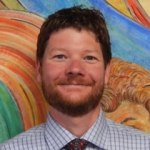This blog post is part of a regular series to inform the AHA Today readership and AHA membership about Career Diversity for Historians, the AHA’s initiative to broaden the career horizons of history PhDs. The University of New Mexico is one of four pilot programs participating in this initiative.
More than 25 years ago, Nike began an advertising campaign with one of the most successful advertising slogans of all time: “Just Do It.” I find this encouraging and empowering message useful when advising graduate students at UNM. This post is an introduction to the Career Diversity program at UNM, and the ways we are trying to encourage history graduate students to “just do it.”
The Department of History at UNM has had success with its PhDs landing jobs outside the professoriate, and we are excited to build upon that foundation with the AHA-Mellon initiative. There are three main elements we’re focusing on in our inaugural year: the upcoming regional conference “What Use Is History?”; our graduate field course on food history and systems in New Mexico; and internships with local and regional organizations.
Within these elements and throughout the program:
We are trying to celebrate every PhD in all career paths. Our upcoming regional conference, “What Use Is History?” will highlight our PhD alumni who work outside the professoriate. For example, Lincoln Bramwell is the chief historian of the US Forest Service, and Judy Morley works at the Centers for Spiritual Living.
We are encouraging students to make connections. We have designed our conference and field course to facilitate as much interaction as possible between graduate students and conference presenters, including UNM alumni, potential employers, and other distinguished guests. Prior to the conference, our students will receive a picture and bio of our featured guests and other potential mentors, internship hosts, and employers who plan to attend. A week before the conference, we have a workshop to practice elevator pitches and networking to maximize the benefits of the conference.
We are focusing on skills as much as content. Our regular workshops focus on the fact that all of the skills that make historians more employable in the “real world” will help them become better university professors. For example, we draw from the career trajectories of faculty who have worked outside the professoriate. In our department, we have faculty that have worked for the Ford Foundation, the Federal Reserve, and a private logistics company, among other places. When we talk about elevator pitches and networking for the purpose of making career connections, we also talk about how and why these are useful to those within the professoriate, too. Likewise, when we talk about what history professors do, we don’t just focus on reading, writing, and teaching history but on widely applicable skills:. We talk about committee work, and managing a departmental budget, as well as working with staff, talking to the media, promoting and selling one’s book, supervising a collaborative project, and pitching a dean or provost.
We are also encouraging students to maximize the campus. One of the things the AHA-Mellon Career Diversity initiative emphasizes is that the university campus itself provides many opportunities to learn the skills needed for employment within or outside academia. At UNM, we have drawn resources and advice from Career Services, Communication and Journalism, Arts Management, English, Business, and others. Our field course carries these connections further by bringing professionals such as university administrators, scientists, editors, nonprofit managers, and digital humanities scholars—coming from both within and outside the campus borders—into the classroom. Through their mentorship, these professionals help our students to gain or hone skills in collaboration, interdisciplinarity, digital methods, and many other areas relevant to the university and the wider world.
Maximizing the campus also means taking advantage of opportunities available only to students. If there is a feasible graduate certificate or even another degree that students could do while they are finishing their PhD, then I encourage them to do it. If there are committees students can sit on, or leadership opportunities on or off campus, then my advice has been “just do it.”
We want our students to be confident. As people with PhDs in history, we are among the world’s most educated persons. We may need to hone some skills, or to learn to talk about them in a new, tailored way, but this is really not that difficult. There is now no shortage of places to find advice on careers for historians, beginning of course with the AHA.
We want our students to be proactive, rather than reactive. There is an English PhD student at UNM who makes a very good living freelancing, and his advice to colleagues is to go knock on doors where writing or editing is needed but where the skills are often in short supply (he mentioned accountants and engineers). One history student here asked me if it was necessary to wait until our internship session at our conference to initiate an internship, and of course, I said no, just do it. This student went to see someone at the institution and e-mailed me, “It was that easy. Thanks, Eric.”
Indeed, we want our students not to be afraid to make connections beyond the department and the campus; that’s half the battle of increasing your career options. We want them to get “out there” and just do it.
Eric L. Payseur is the AHA-Mellon Postdoctoral Fellow for Career Diversity and the History PhD in the Department of History at the University of New Mexico (UNM). He was a community garden coordinator and urban agriculture director in Toronto’s non-profit sector during his PhD years at York University.
This post first appeared on AHA Today.
Tags: AHA Today Career Diversity for Historians Graduate Education
Comment
Please read our commenting and letters policy before submitting.







